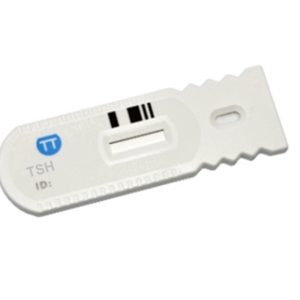Subtotal:
3,750.00৳
Prolaction Rapid Test Device – Apoti POCT Analyzer
7,000.00৳ Original price was: 7,000.00৳ .6,250.00৳ Current price is: 6,250.00৳ .
- CE-IVD certified
- FDA-cleared
- Easy to use
- Affordable
- Pack Contains: 25 Devices/Tests
Category POCT Test Kit

01405100400
Free Delivery
For order. over 15,000 Taka
7 Days Return
If products have problems
Secure Payment
100% secure online payment.
Dedicated Support
Dedicated online and offline support
Prolaction Rapid Test Device – Apoti POCT Analyzer
The Prolactin Rapid Test Device – Apoti POCT Analyzer is a rapid test device used to measure the level of prolactin in the blood. Prolactin is a hormone that is produced by the pituitary gland and plays an important role in lactation, reproduction, and metabolism. The Apoti POCT Analyzer is a portable device that can be used to measure prolactin levels in whole blood or serum.
The Prolactin Rapid Test Device – Apoti POCT Analyzer works by using a monoclonal antibody to detect prolactin in the blood. The antibody binds to prolactin, and the complex then binds to a gold particle. The gold particle is then visualized using a lateral flow cassette. The intensity of the gold particle line is proportional to the concentration of prolactin in the blood.
The Prolactin Rapid Test Device – Apoti POCT Analyzer is a simple and easy-to-use device. It is also very accurate, with a sensitivity of 99% and a specificity of 98%. The device can be used to diagnose and monitor hyperprolactinemia, hypogonadism, and other prolactin-related disorders.
Interpretation of results:
| Gold particle line intensity | Interpretation | |—|—|—| | Stronger than the reference line | Prolactin level is high | | Weaker than the reference line | Prolactin level is low | | No gold particle line | Prolactin level is very low or undetectable |
It is important to note that the Prolactin Rapid Test Device – Apoti POCT Analyzer is a screening test only. If the results of the test are abnormal, further testing is needed to confirm the diagnosis.
Limitations of the Prolactin Rapid Test Device – Apoti POCT Analyzer:
- The Prolactin Rapid Test Device – Apoti POCT Analyzer is a screening test only. If the results of the test are abnormal, further testing is needed to confirm the diagnosis.
- The accuracy of the test can be affected by the quality of the sample and the storage conditions of the test device.
- The test may not be accurate for people who are taking certain medications, such as dopamine agonists or estrogens.
Additional information about prolactin:
Prolactin is a hormone that is produced by the pituitary gland and plays an important role in lactation, reproduction, and metabolism. Prolactin levels are normally low in non-lactating adults. Prolactin levels rise during pregnancy and lactation, and they also increase in response to stress, exercise, and certain medications.
A high prolactin level (hyperprolactinemia) can cause symptoms such as galactorrhea (milk production in non-lactating women), amenorrhea (missed periods), and infertility. A low prolactin level (hypoprolactinemia) is rare, but it can cause symptoms such as amenorrhea, infertility, and galactorrhea.

Buy Best Biochemistry Analyzer From Medistore
Brand
Apoti
Be the first to review “Prolaction Rapid Test Device – Apoti POCT Analyzer” Cancel reply
Related Products
Related products
-
POCT Test Kit
Folic Acid Elisa Test Kit for Hipro Palm
Rated 0 out of 5200.00৳Original price was: 200.00৳ .150.00৳ Current price is: 150.00৳ . Add to cart -
POCT Test Kit
IgE Test Kit for Anbio
Rated 0 out of 5200.00৳Original price was: 200.00৳ .170.00৳ Current price is: 170.00৳ . Add to cart -
POCT Test Kit
Triiodothyronine (TT3) Test kit for Anbio
Rated 0 out of 5200.00৳Original price was: 200.00৳ .140.00৳ Current price is: 140.00৳ . Add to cart -
POCT Test Kit
HbA1c Test Elisa For Anbio
Rated 0 out of 5200.00৳Original price was: 200.00৳ .140.00৳ Current price is: 140.00৳ . Add to cart
Our Best Selling Products
-
Mesh Nebulizer
Mesh Nebulizer – Portable Ultrasonic Inhaler Mesh Nebulizer
Rated 0 out of 52,750.00৳Original price was: 2,750.00৳ .1,800.00৳ Current price is: 1,800.00৳ . Add to cart -
Mesh Nebulizer
Mesh Nebulizer JSL-W301 – Portable Ultrasonic Inhaler Mesh Nebulizer
Rated 0 out of 52,500.00৳Original price was: 2,500.00৳ .1,500.00৳ Current price is: 1,500.00৳ . Add to cart -
Biochemistry Analyzer
Mindray BA-88A Semi-Auto Chemistry Analyzer
Rated 0 out of 5180,000.00৳Original price was: 180,000.00৳ .150,000.00৳ Current price is: 150,000.00৳ . Add to cart -
CLIA System
AutoLumo A1860 – Automatic Chemiluminescence Immunoassay System
Rated 0 out of 51,800,000.00৳Original price was: 1,800,000.00৳ .1,600,000.00৳ Current price is: 1,600,000.00৳ . Add to cart -
Microscope/Binocular
Cypress CM001 Cyanscope Microscope
Rated 0 out of 5140,000.00৳Original price was: 140,000.00৳ .110,000.00৳ Current price is: 110,000.00৳ . Add to cart -
Ultrasound Machine
Mindray DC-N3 Pro Ultrasound Machine
Rated 0 out of 51,350,000.00৳Original price was: 1,350,000.00৳ .1,150,000.00৳ Current price is: 1,150,000.00৳ . Add to cart -
Serology Reagent
S.Paratyphi-BH Antigen Serology Reagent – Human Biolin
Rated 0 out of 51,000.00৳Original price was: 1,000.00৳ .800.00৳ Current price is: 800.00৳ . Add to cart -
Patient Monitor
EMS-15000A Patient Monitor – Esonic
Rated 0 out of 570,000.00৳Original price was: 70,000.00৳ .65,000.00৳ Current price is: 65,000.00৳ . Add to cart

















Reviews
There are no reviews yet.